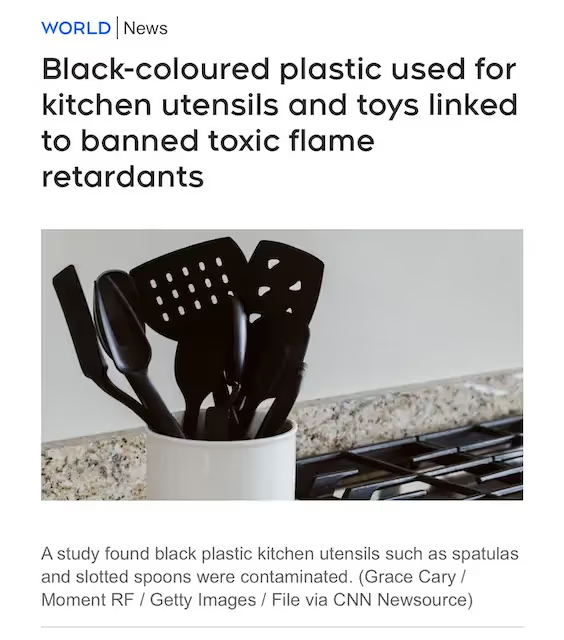
Flame retardants in the kitchen: invisible, but dangerous

Your kitchen utensils might contain toxic flame retardants. Black recycled plastic can have harmful substances that impact your health.
Flame retardants, chemicals designed to prevent fires, are crucial in the electronics industry. They ensure that devices are less likely to catch fire and thus contribute to our safety. But what if these substances also appear in products that we use in the kitchen every day? Reusing plastic from electronic waste seems like a sustainable choice, but many kitchen utensils made from recycled black plastic contain harmful chemicals, such as brominated flame retardants (BFRs), that are linked to cancer, endocrine disruptions and nerve damage.
Household products full of harmful substances
From a recent study, published in the scientific journal Chemosphere, it appears that no less than 85% of the household products studied contain traces of flame retardants. In some cases, concentrations of up to 22,800 mg per kilogram were measured. This means that consumers are unconsciously exposed to potentially dangerous chemicals that can end up in our food via kitchen utensils. The same study found that consumers who use contaminated kitchenware can ingest up to 34,700 nanograms of bromine compounds daily — an intake that far exceeds dust and food exposure.
The health risks of this exposure should not be underestimated. Flame retardants such as BFRs and organophosphate flame retardants (OPFRs) are known for their harmful effects on human health. Various scientific studies indicate that these substances can disrupt the hormonal balance, increase the risk of cancer and damage the reproduction and development of the nervous system. Brominated compounds, such as Deca-BDE, in particular, which are commonly found in electronic devices, have a long half-life and can accumulate in the environment and in our bodies.
Although in theory strict rules should apply to the reuse of electronic waste, practice shows a serious lack of transparency. Legislation concerning the use of flame retardants in recycled products is limited and often unclear. This ensures that consumers are unknowingly exposed to harmful substances, even through products that do not require fire resistant properties at all, such as kitchenware.
So:
- Down with black plastic! Black recycled plastic kitchen utensils? You'd better throw that in the bin. Instead, choose safe alternatives.
- Go for natural materials. Wooden spoons, stainless steel spatulas are safe and sustainable alternatives that contain no toxic substances.
- Pay attention to labels. Buy good quality products and look for labels that indicate that they are free of harmful substances.
Conclusion: Pay attention to what you use in your kitchen. And of course, for the daily detox is SMPL72 the perfect solution.















